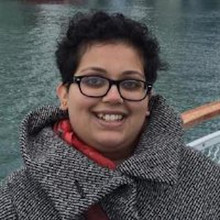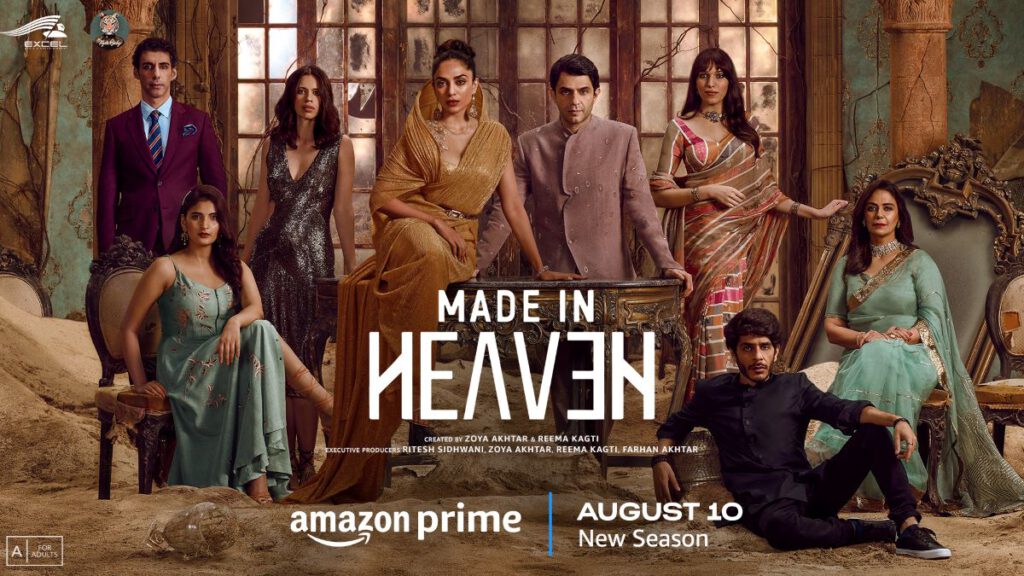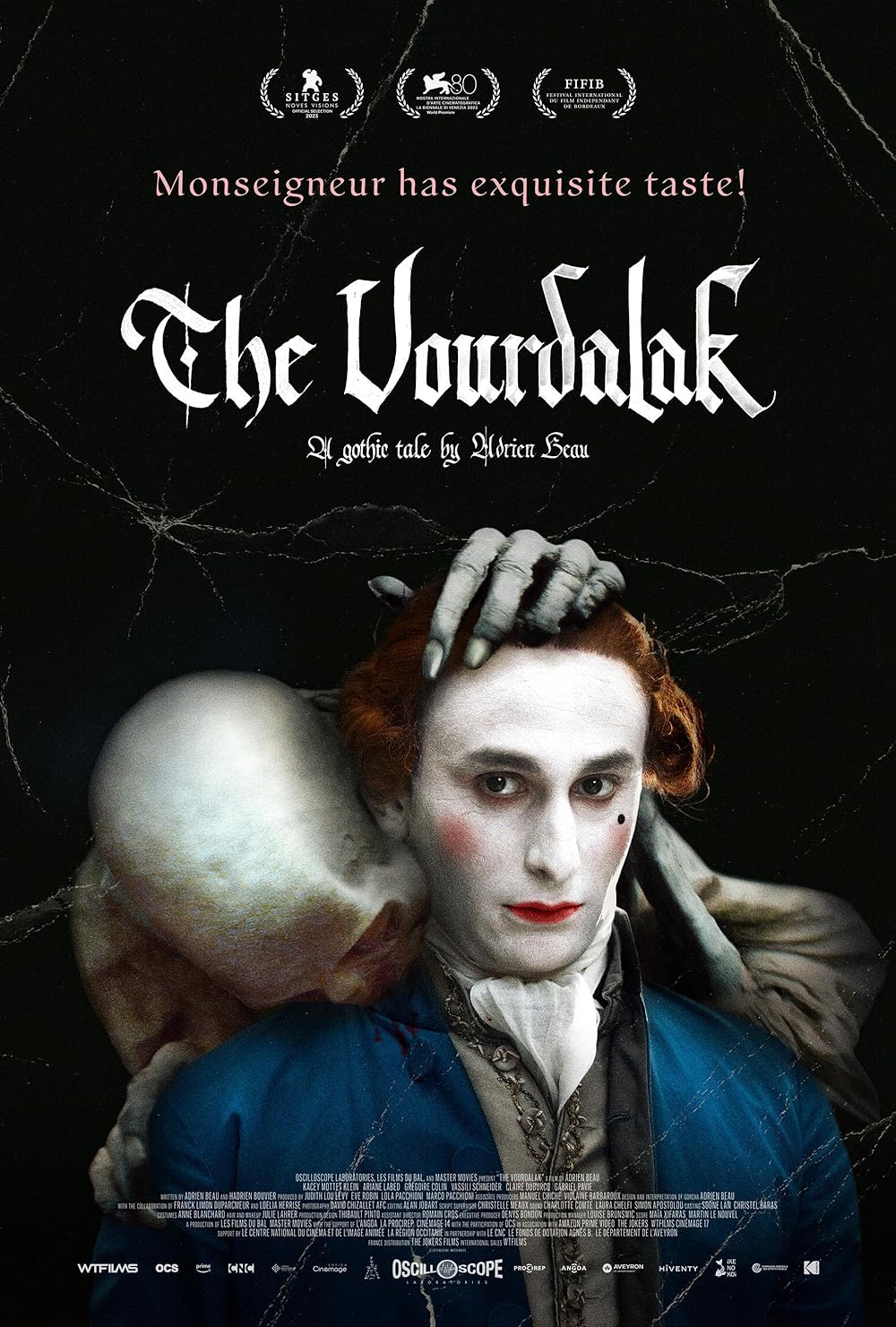Warning: This review includes mentions of sexual assault and domestic violence.
It is more than a little difficult to review a series that may be completely unknown to the audience of this publication, because there is no way to discuss this terrific series' second season without revealing major spoilers from its first. (Consider reading my essay on the first season, published back in 2019.) Nonetheless, if a review full of season one spoilers expands the reach of one of India's best TV shows, so be it.
Writer and director Zoya Akhtar and her frequent creative partner Reema Kagti created the anthology drama series "Made in Heaven" back in 2019 to question, critique, and, yes, celebrate the effort that goes into an Indian wedding. Sobhita Dhulipala and Arjun Mathur lead a phenomenal ensemble cast as Tara Khanna and Karan Mehra, respectively, best friends and co-owners of Made in Heaven, wedding planners to the one percent in New Delhi. The core cast's story arcs continue throughout the season, but each episode features a different couple engaging MIH's services. Technically the planners are tasked only with decor, venue, and food; Karan and Tara are almost always made to do so much more. They dispense therapy; they advise angry brides to not walk away from classist in-laws. Occasionally, they help stop the proceedings altogether.

Aiding Tara and Karan in these dysfunctional odysseys are Jaspreet "Jazz" Kaur (Shivani Raghuvanshi), who longs to erase every trace of her working-class roots by working at an elite wedding planning agency, and Karan Basrai (Shashank Arora), MIH's in-house videographer, whose cynical worldview is used as narration for the end of each episode. In Season One, we also met rich divorcee Faiza Naqvi (Kalki Koechlin), Tara's best friend, who is honoring their friendship by sleeping with Adil Khanna (Jim Sarbh), Tara's multimillionaire husband. By the end of Season One, Tara and Adil's marriage was on the rocks, and so was MIH's future. But Karan, whose homosexuality was an open secret, fought and won a public battle to be openly and proudly gay; his story arc coincided with the decriminalization of homosexuality in India.

The seven episodes that comprise Season Two are much darker and deeper than the first season's offerings. On the docket are pervasive issues that plague India today, including colorism, caste discrimination, homophobia, transphobia, and domestic violence. Tara and Karan have never batted a thousand, but this time, the limits of their abilities are on full, unflinching display. Though the planners and the groom encourage Sarina (Zayn Marie Khan), a dark-skinned bride, to love herself, she still slathers skin-lightening cream on her skin. I remember using similar products in high school; the shame I feel at the memory is worse than the burning sensation of the bleach on my face. That is the true power of this series: every battle feels personal and frighteningly reminiscent of my own experiences. In the second episode, which I hope will be prefaced by a trigger warning upon its premiere, an abusive groom (Siddhant Karnick) convinces his bride (Mrunal Thakur) during an eleventh-hour meltdown that he needs help and her love to be better. I wanted to scream at my computer as she circles the sacred fire, her parents weeping silently and helplessly, my own memories of an abusive relationship swirling in my vision, "He's lying! He's never going to change!"
The best part of this new season is the acting. (The costumes are also a draw, but I'll save that for a separate essay.) Dhulipala and Mathur share marvelous chemistry. The push and pull of their bond as friends and business partners—and now roommates, as Tara is in a messy divorce from Adil—is tested in grim ways, but the two actors continue finding unique notes of grace and sorrow in their scenes. While Tara's pain is public (she has lost all her friends in the divorce, she takes cabs instead of private cars, she can't afford the same wardrobe), Karan's struggle is internal: his bigot mother, now dying of cancer, continues to hate him from her deathbed; Mathur colors each moment of grief and self-hatred with restraint, never letting us forget how deep and private Karan's pain truly is. Raghuvanshi remains stellar as Jazz, a young woman growing, discovering, and staying true to herself without apologies. Joining the central cast is Mona Singh as Bulbul, MIH's new auditor, and wife of company investor Ramesh Jauhari (the ever-fantastic Vijay Raaz). This is a dynamite pairing.

Jauhari is quietly fearsome, but in Raaz's scenes with Singh, we glimpse his ocean of love for Bulbul, whom he supports unreservedly. Bulbul seems hellbent on upending the way MIH does business, but her complex past, revealed slowly and movingly, brings her closer to her new colleagues. Singh's performance, as well as that of Manini Mishra, who plays Tara's calculating but not entirely incorrect mother Vimala, reminds me of Bryan Cranston's anecdote about how soap opera roles forced him to be word-perfect and taught him to plow through reams of dialogue. Mishra and Mona Singh hail from Hindi soaps, and like Cranston, their performances are imbued with unmatched precision, commanding the camera with ease and depth.
But this season belongs to MIH's new head of production and trans woman, Meher Chaudhary (Trinetra Haldar Gummaraju, who is trans herself). Fully at ease, she does not suffer fools or disrespect from anyone. Meher is as beautiful as she is steely; her head is always held high, confident, never uttering an errant word, a beacon of serenity in a vortex of chaos. Best of all, as a marginalized person in an office that continually deals with privilege, Meher even questions Tara's prejudice, forcing everyone to reevaluate how evolved they really are.
Every episode of "Made in Heaven" is also studded with glorious performances from guest performers. As the groom's father in Episode Three, Sanjay Kapor is hilariously bombastic and chipper; the poor sod has no idea what's about to hit him. Radhika Apte is fierce and inspiring as a Dalit woman whose fight for equality extends to her wedding plans. As Dr. Sood, Faiza's long-suffering therapist, Deepti Datt conveys whole worlds of disapproval with just a few lines and blink-and-you-miss-it eye-rolls. Dia Mirza was born to play Shehnaz, the dignified, heartbroken wife of a Muslim man who is exercising the Islamic right to polygamy by marrying a much younger, blonde, white woman. Though she seems like she's holding it together, the humiliation and loss of her new circumstances continue chipping away at Shehnaz till her veneer drops. Never has a face more beautiful looked so ravaged.
Season Two has flaws, and its writing is slightly more prone to preachiness than Season One. Ishwak Singh is handed a half-baked subplot as Raghav, Tara's new chef boyfriend; the actor is capable and deserving of much more. Jazz and Kabir's will-they, won't-they turns into an interminable "situationship." I still find it impossible to care about or root for Adil and Faiza's selfish relationship. And for a series that so proudly views modern India through a feminist and queer-forward lens, I still do not understand why we need Kabir's narration to sum up each episode's lessons (nor do we need the subplot of the documentary Kabir is creating from his wedding footage). It's an unusually patronizing note from a series that seeks to dismantle the patriarchy.
But overall, this season shines a light on issues that Indians would rather not discuss. Given the fascist governance of the Bharatiya Janta Party and Prime Minister Narendra Modi, speaking forcefully through art to support marginalized communities is no small feat. Akhtar, Kagti, and their collaborators deserve rousing applause for their arresting, imperfect creation and for helping the audience realize the difference between investing in your wedding versus investing in your marriage.
On Prime Video now.












